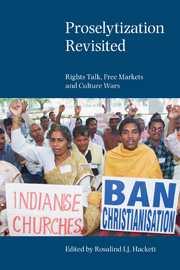Book contents
- Frontmatter
- Contents
- Preface and acknowledgements
- Contributors
- Revisiting Proselytization in the Context of Rights Talk, Free Markets and Culture Wars
- Section I
- Section II
- The Changing Face of Christian Proselytizing: New Actors from the Global South
- Muslim Apostasy, Christian Conversion, and Religious Freedom in Egypt
- Seeing is More Than Believing: Posters and Proselytization in Nigeria
- Section III
- Section IV
- Section V
- Index
The Changing Face of Christian Proselytizing: New Actors from the Global South
from Section II
- Frontmatter
- Contents
- Preface and acknowledgements
- Contributors
- Revisiting Proselytization in the Context of Rights Talk, Free Markets and Culture Wars
- Section I
- Section II
- The Changing Face of Christian Proselytizing: New Actors from the Global South
- Muslim Apostasy, Christian Conversion, and Religious Freedom in Egypt
- Seeing is More Than Believing: Posters and Proselytization in Nigeria
- Section III
- Section IV
- Section V
- Index
Summary
Introduction
The chapter looks at the implications, for global debates on the rights and wrongs of religious proselytization, of Christian missions originating from what is now often called the “Global South” (Latin America, Africa, Asia and the Pacific), a growing phenomenon on which very little academic study has been done. This new reality will be briefly outlined and then related to the controversies surrounding, and real or attempted political restrictions on, religious proselytization. How do these controversies affect the phenomenon analyzed? And, conversely, how does the “changing face” of Christian proselytizing affect the debate on proselytization, its social acceptability and its political legitimacy? To what extent is the validity of various arguments for or against proselytization cast in a different light when the identity of the proselytizers changes radically, especially when the new actors have the legitimacy of being from the oppressed “Global South” and are not obliged to carry post-colonial stigma?
Proselytization and global civil society
The article on religion and global civil society by George Thomas (2001) will serve as an introduction to our topic. How, he asks, can we construct a global civil society in which people may be intensely religious and yet live together? What Thomas calls the “world cultural principles” structuring global civil society are inherently hostile to proselytizing. This is seen as illegitimate because, firstly, it depicts one religion as truer than all others, thus falling foul of the now commonplace principle that affirmations to be the one true religion are of the same essence as intolerance and civil exclusion.
- Type
- Chapter
- Information
- Proselytization RevisitedRights Talk, Free Markets and Culture Wars, pp. 109 - 138Publisher: Acumen PublishingPrint publication year: 2008



